Analyzing Psychosocial Impact of Diabetes: A Case Study Report
VerifiedAdded on 2023/01/13
|11
|3078
|72
Report
AI Summary
This report delves into the psychosocial impact of a diabetes diagnosis, focusing on a case study of a 40-year-old woman named Carolyn, recently diagnosed with Type 2 Diabetes Mellitus (T2DM). The assignment explores the potential social and psychological consequences of the diagnosis, including depression, social isolation, and negative body image, and how these factors impede effective self-management of the condition. The report highlights the barriers to optimal diabetes management, such as the lack of knowledge about the disease and psychological issues. The report then suggests the use of the Primary Care Screening Questionnaire for Depression (PSQ4D) to assess Carolyn's psychological status, justifying the selection based on its suitability for detecting depression in patients with chronic health conditions. The report concludes by emphasizing the importance of understanding and addressing the psychosocial aspects of diabetes to improve patient outcomes and self-management.
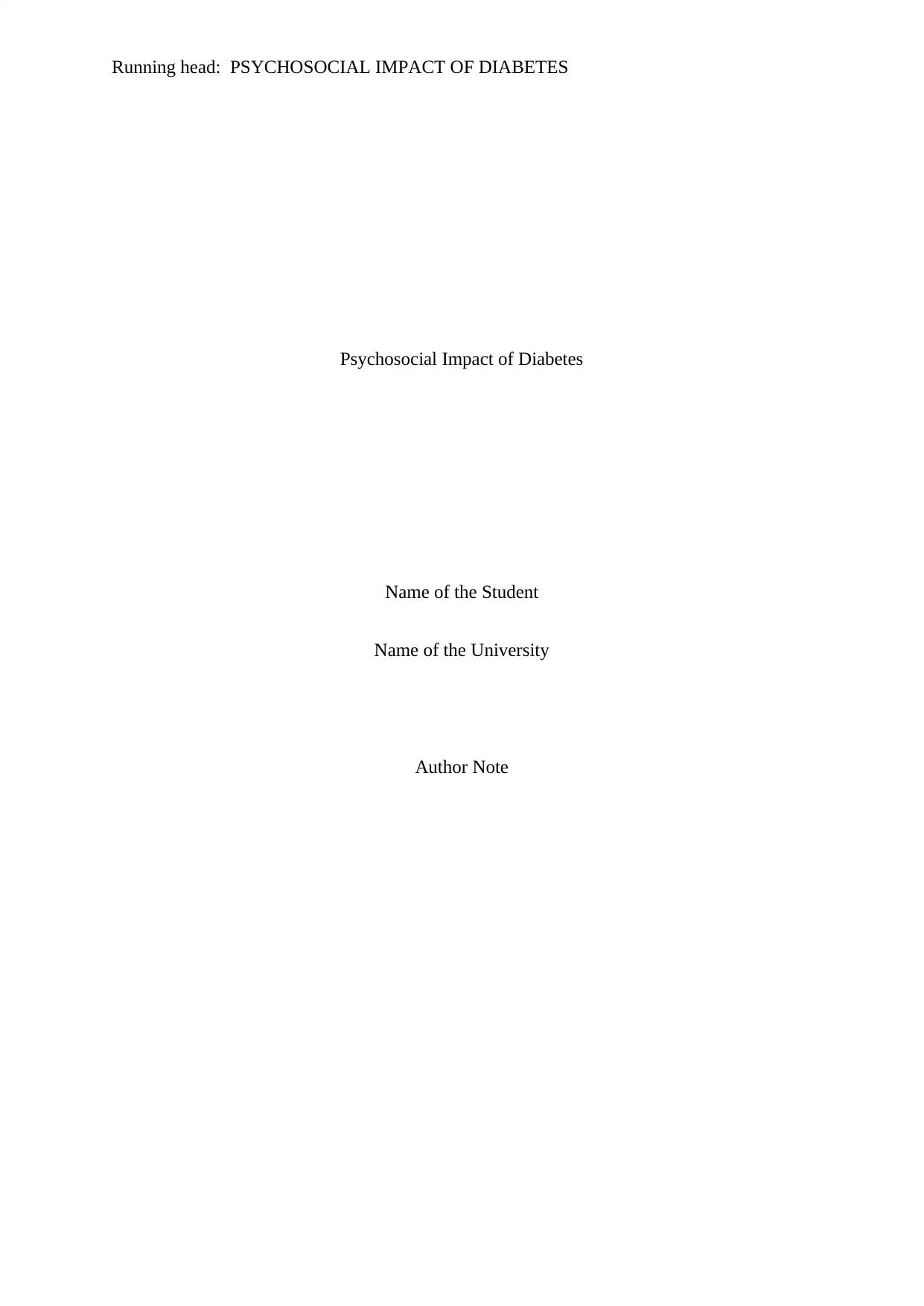
Running head: PSYCHOSOCIAL IMPACT OF DIABETES
Psychosocial Impact of Diabetes
Name of the Student
Name of the University
Author Note
Psychosocial Impact of Diabetes
Name of the Student
Name of the University
Author Note
Paraphrase This Document
Need a fresh take? Get an instant paraphrase of this document with our AI Paraphraser
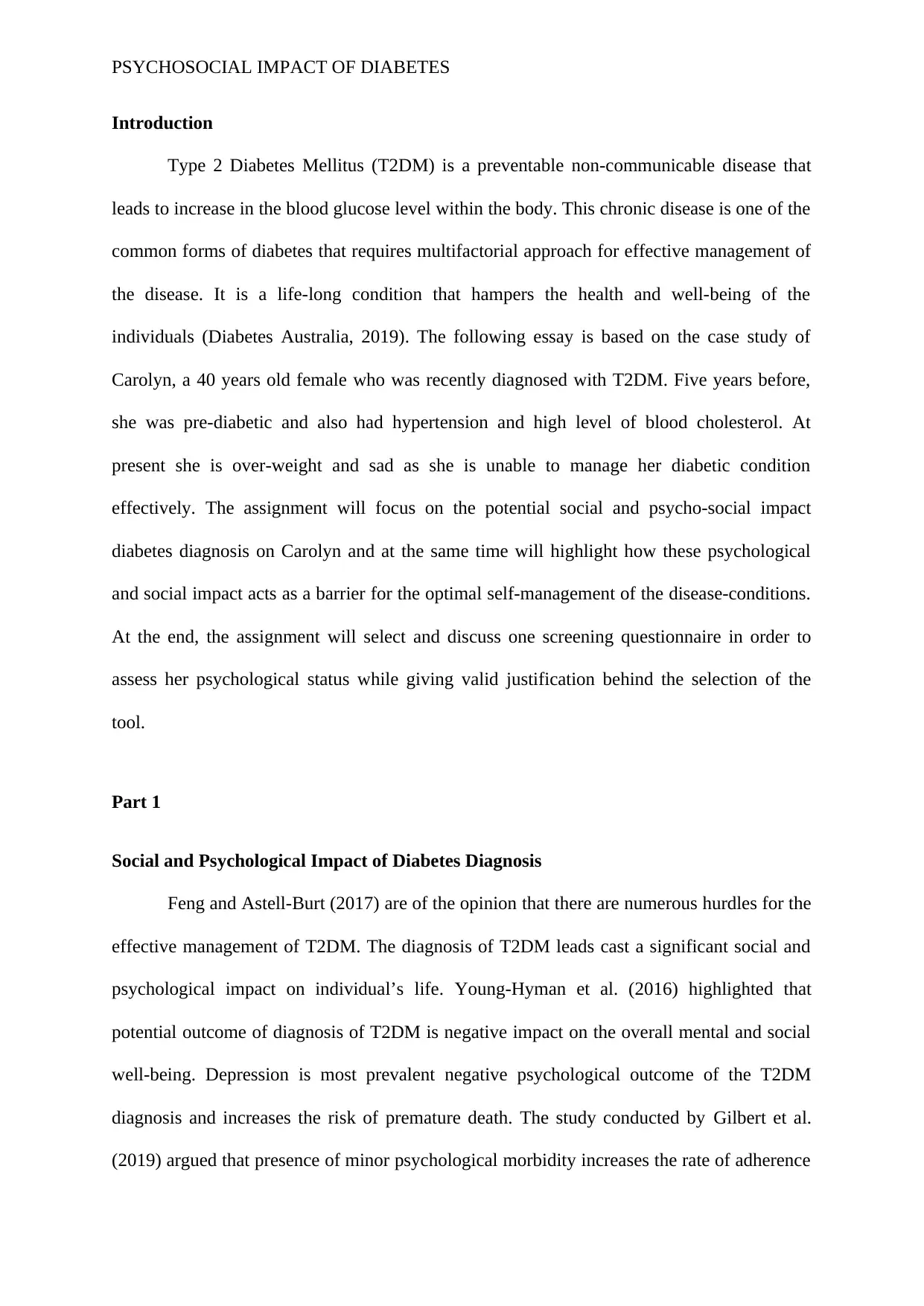
PSYCHOSOCIAL IMPACT OF DIABETES
Introduction
Type 2 Diabetes Mellitus (T2DM) is a preventable non-communicable disease that
leads to increase in the blood glucose level within the body. This chronic disease is one of the
common forms of diabetes that requires multifactorial approach for effective management of
the disease. It is a life-long condition that hampers the health and well-being of the
individuals (Diabetes Australia, 2019). The following essay is based on the case study of
Carolyn, a 40 years old female who was recently diagnosed with T2DM. Five years before,
she was pre-diabetic and also had hypertension and high level of blood cholesterol. At
present she is over-weight and sad as she is unable to manage her diabetic condition
effectively. The assignment will focus on the potential social and psycho-social impact
diabetes diagnosis on Carolyn and at the same time will highlight how these psychological
and social impact acts as a barrier for the optimal self-management of the disease-conditions.
At the end, the assignment will select and discuss one screening questionnaire in order to
assess her psychological status while giving valid justification behind the selection of the
tool.
Part 1
Social and Psychological Impact of Diabetes Diagnosis
Feng and Astell-Burt (2017) are of the opinion that there are numerous hurdles for the
effective management of T2DM. The diagnosis of T2DM leads cast a significant social and
psychological impact on individual’s life. Young-Hyman et al. (2016) highlighted that
potential outcome of diagnosis of T2DM is negative impact on the overall mental and social
well-being. Depression is most prevalent negative psychological outcome of the T2DM
diagnosis and increases the risk of premature death. The study conducted by Gilbert et al.
(2019) argued that presence of minor psychological morbidity increases the rate of adherence
Introduction
Type 2 Diabetes Mellitus (T2DM) is a preventable non-communicable disease that
leads to increase in the blood glucose level within the body. This chronic disease is one of the
common forms of diabetes that requires multifactorial approach for effective management of
the disease. It is a life-long condition that hampers the health and well-being of the
individuals (Diabetes Australia, 2019). The following essay is based on the case study of
Carolyn, a 40 years old female who was recently diagnosed with T2DM. Five years before,
she was pre-diabetic and also had hypertension and high level of blood cholesterol. At
present she is over-weight and sad as she is unable to manage her diabetic condition
effectively. The assignment will focus on the potential social and psycho-social impact
diabetes diagnosis on Carolyn and at the same time will highlight how these psychological
and social impact acts as a barrier for the optimal self-management of the disease-conditions.
At the end, the assignment will select and discuss one screening questionnaire in order to
assess her psychological status while giving valid justification behind the selection of the
tool.
Part 1
Social and Psychological Impact of Diabetes Diagnosis
Feng and Astell-Burt (2017) are of the opinion that there are numerous hurdles for the
effective management of T2DM. The diagnosis of T2DM leads cast a significant social and
psychological impact on individual’s life. Young-Hyman et al. (2016) highlighted that
potential outcome of diagnosis of T2DM is negative impact on the overall mental and social
well-being. Depression is most prevalent negative psychological outcome of the T2DM
diagnosis and increases the risk of premature death. The study conducted by Gilbert et al.
(2019) argued that presence of minor psychological morbidity increases the rate of adherence
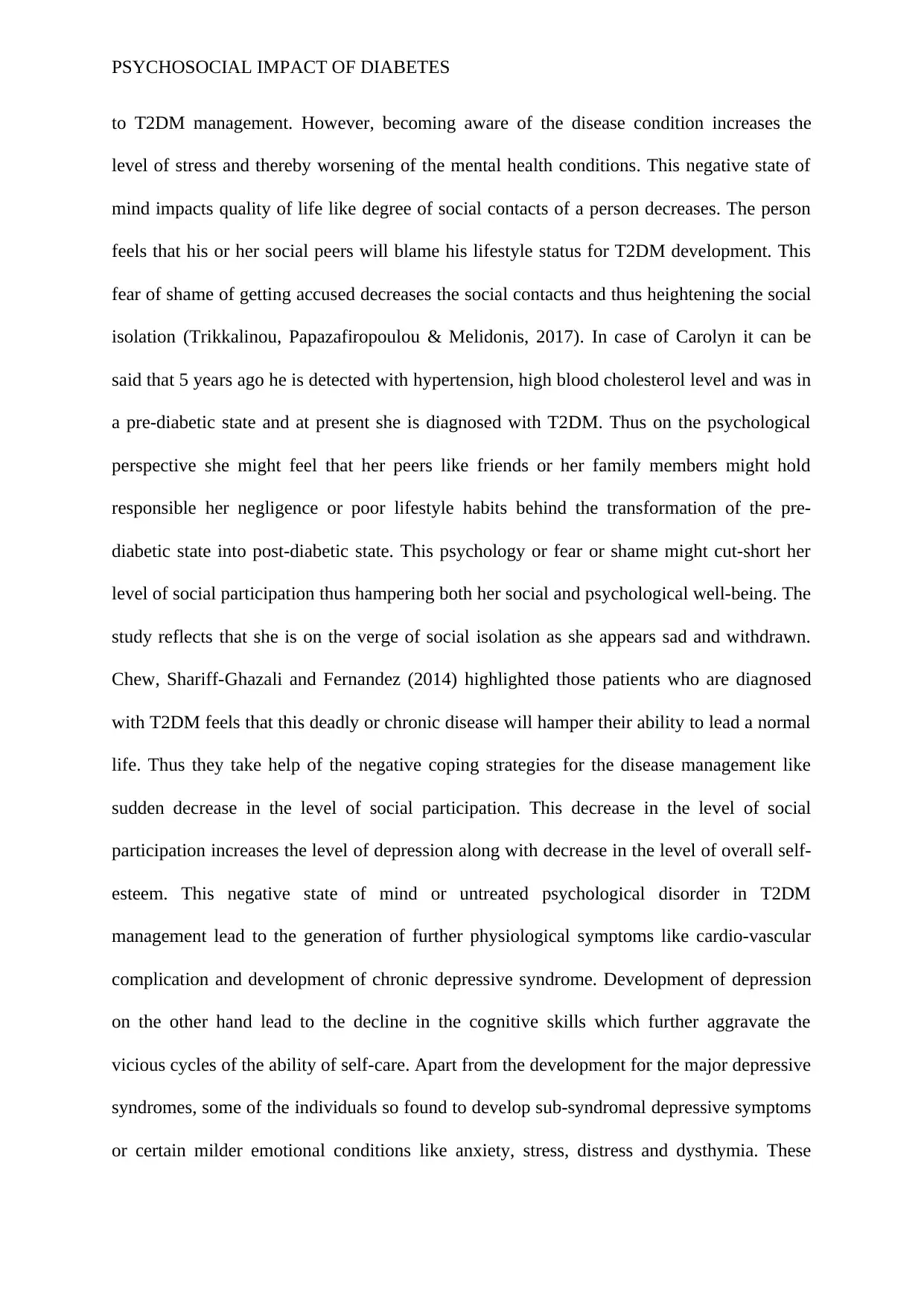
PSYCHOSOCIAL IMPACT OF DIABETES
to T2DM management. However, becoming aware of the disease condition increases the
level of stress and thereby worsening of the mental health conditions. This negative state of
mind impacts quality of life like degree of social contacts of a person decreases. The person
feels that his or her social peers will blame his lifestyle status for T2DM development. This
fear of shame of getting accused decreases the social contacts and thus heightening the social
isolation (Trikkalinou, Papazafiropoulou & Melidonis, 2017). In case of Carolyn it can be
said that 5 years ago he is detected with hypertension, high blood cholesterol level and was in
a pre-diabetic state and at present she is diagnosed with T2DM. Thus on the psychological
perspective she might feel that her peers like friends or her family members might hold
responsible her negligence or poor lifestyle habits behind the transformation of the pre-
diabetic state into post-diabetic state. This psychology or fear or shame might cut-short her
level of social participation thus hampering both her social and psychological well-being. The
study reflects that she is on the verge of social isolation as she appears sad and withdrawn.
Chew, Shariff-Ghazali and Fernandez (2014) highlighted those patients who are diagnosed
with T2DM feels that this deadly or chronic disease will hamper their ability to lead a normal
life. Thus they take help of the negative coping strategies for the disease management like
sudden decrease in the level of social participation. This decrease in the level of social
participation increases the level of depression along with decrease in the level of overall self-
esteem. This negative state of mind or untreated psychological disorder in T2DM
management lead to the generation of further physiological symptoms like cardio-vascular
complication and development of chronic depressive syndrome. Development of depression
on the other hand lead to the decline in the cognitive skills which further aggravate the
vicious cycles of the ability of self-care. Apart from the development for the major depressive
syndromes, some of the individuals so found to develop sub-syndromal depressive symptoms
or certain milder emotional conditions like anxiety, stress, distress and dysthymia. These
to T2DM management. However, becoming aware of the disease condition increases the
level of stress and thereby worsening of the mental health conditions. This negative state of
mind impacts quality of life like degree of social contacts of a person decreases. The person
feels that his or her social peers will blame his lifestyle status for T2DM development. This
fear of shame of getting accused decreases the social contacts and thus heightening the social
isolation (Trikkalinou, Papazafiropoulou & Melidonis, 2017). In case of Carolyn it can be
said that 5 years ago he is detected with hypertension, high blood cholesterol level and was in
a pre-diabetic state and at present she is diagnosed with T2DM. Thus on the psychological
perspective she might feel that her peers like friends or her family members might hold
responsible her negligence or poor lifestyle habits behind the transformation of the pre-
diabetic state into post-diabetic state. This psychology or fear or shame might cut-short her
level of social participation thus hampering both her social and psychological well-being. The
study reflects that she is on the verge of social isolation as she appears sad and withdrawn.
Chew, Shariff-Ghazali and Fernandez (2014) highlighted those patients who are diagnosed
with T2DM feels that this deadly or chronic disease will hamper their ability to lead a normal
life. Thus they take help of the negative coping strategies for the disease management like
sudden decrease in the level of social participation. This decrease in the level of social
participation increases the level of depression along with decrease in the level of overall self-
esteem. This negative state of mind or untreated psychological disorder in T2DM
management lead to the generation of further physiological symptoms like cardio-vascular
complication and development of chronic depressive syndrome. Development of depression
on the other hand lead to the decline in the cognitive skills which further aggravate the
vicious cycles of the ability of self-care. Apart from the development for the major depressive
syndromes, some of the individuals so found to develop sub-syndromal depressive symptoms
or certain milder emotional conditions like anxiety, stress, distress and dysthymia. These
⊘ This is a preview!⊘
Do you want full access?
Subscribe today to unlock all pages.

Trusted by 1+ million students worldwide
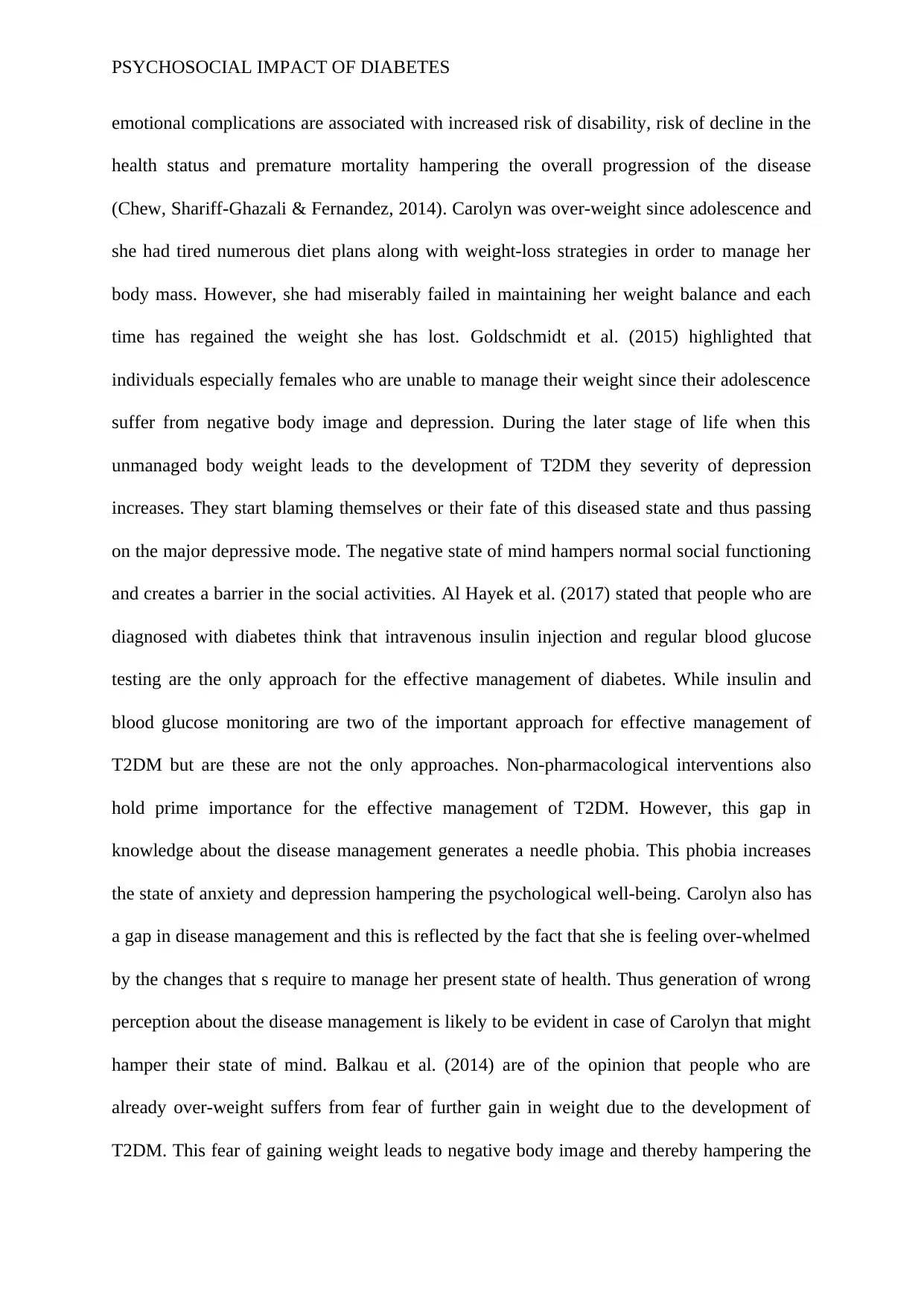
PSYCHOSOCIAL IMPACT OF DIABETES
emotional complications are associated with increased risk of disability, risk of decline in the
health status and premature mortality hampering the overall progression of the disease
(Chew, Shariff-Ghazali & Fernandez, 2014). Carolyn was over-weight since adolescence and
she had tired numerous diet plans along with weight-loss strategies in order to manage her
body mass. However, she had miserably failed in maintaining her weight balance and each
time has regained the weight she has lost. Goldschmidt et al. (2015) highlighted that
individuals especially females who are unable to manage their weight since their adolescence
suffer from negative body image and depression. During the later stage of life when this
unmanaged body weight leads to the development of T2DM they severity of depression
increases. They start blaming themselves or their fate of this diseased state and thus passing
on the major depressive mode. The negative state of mind hampers normal social functioning
and creates a barrier in the social activities. Al Hayek et al. (2017) stated that people who are
diagnosed with diabetes think that intravenous insulin injection and regular blood glucose
testing are the only approach for the effective management of diabetes. While insulin and
blood glucose monitoring are two of the important approach for effective management of
T2DM but are these are not the only approaches. Non-pharmacological interventions also
hold prime importance for the effective management of T2DM. However, this gap in
knowledge about the disease management generates a needle phobia. This phobia increases
the state of anxiety and depression hampering the psychological well-being. Carolyn also has
a gap in disease management and this is reflected by the fact that she is feeling over-whelmed
by the changes that s require to manage her present state of health. Thus generation of wrong
perception about the disease management is likely to be evident in case of Carolyn that might
hamper their state of mind. Balkau et al. (2014) are of the opinion that people who are
already over-weight suffers from fear of further gain in weight due to the development of
T2DM. This fear of gaining weight leads to negative body image and thereby hampering the
emotional complications are associated with increased risk of disability, risk of decline in the
health status and premature mortality hampering the overall progression of the disease
(Chew, Shariff-Ghazali & Fernandez, 2014). Carolyn was over-weight since adolescence and
she had tired numerous diet plans along with weight-loss strategies in order to manage her
body mass. However, she had miserably failed in maintaining her weight balance and each
time has regained the weight she has lost. Goldschmidt et al. (2015) highlighted that
individuals especially females who are unable to manage their weight since their adolescence
suffer from negative body image and depression. During the later stage of life when this
unmanaged body weight leads to the development of T2DM they severity of depression
increases. They start blaming themselves or their fate of this diseased state and thus passing
on the major depressive mode. The negative state of mind hampers normal social functioning
and creates a barrier in the social activities. Al Hayek et al. (2017) stated that people who are
diagnosed with diabetes think that intravenous insulin injection and regular blood glucose
testing are the only approach for the effective management of diabetes. While insulin and
blood glucose monitoring are two of the important approach for effective management of
T2DM but are these are not the only approaches. Non-pharmacological interventions also
hold prime importance for the effective management of T2DM. However, this gap in
knowledge about the disease management generates a needle phobia. This phobia increases
the state of anxiety and depression hampering the psychological well-being. Carolyn also has
a gap in disease management and this is reflected by the fact that she is feeling over-whelmed
by the changes that s require to manage her present state of health. Thus generation of wrong
perception about the disease management is likely to be evident in case of Carolyn that might
hamper their state of mind. Balkau et al. (2014) are of the opinion that people who are
already over-weight suffers from fear of further gain in weight due to the development of
T2DM. This fear of gaining weight leads to negative body image and thereby hampering the
Paraphrase This Document
Need a fresh take? Get an instant paraphrase of this document with our AI Paraphraser
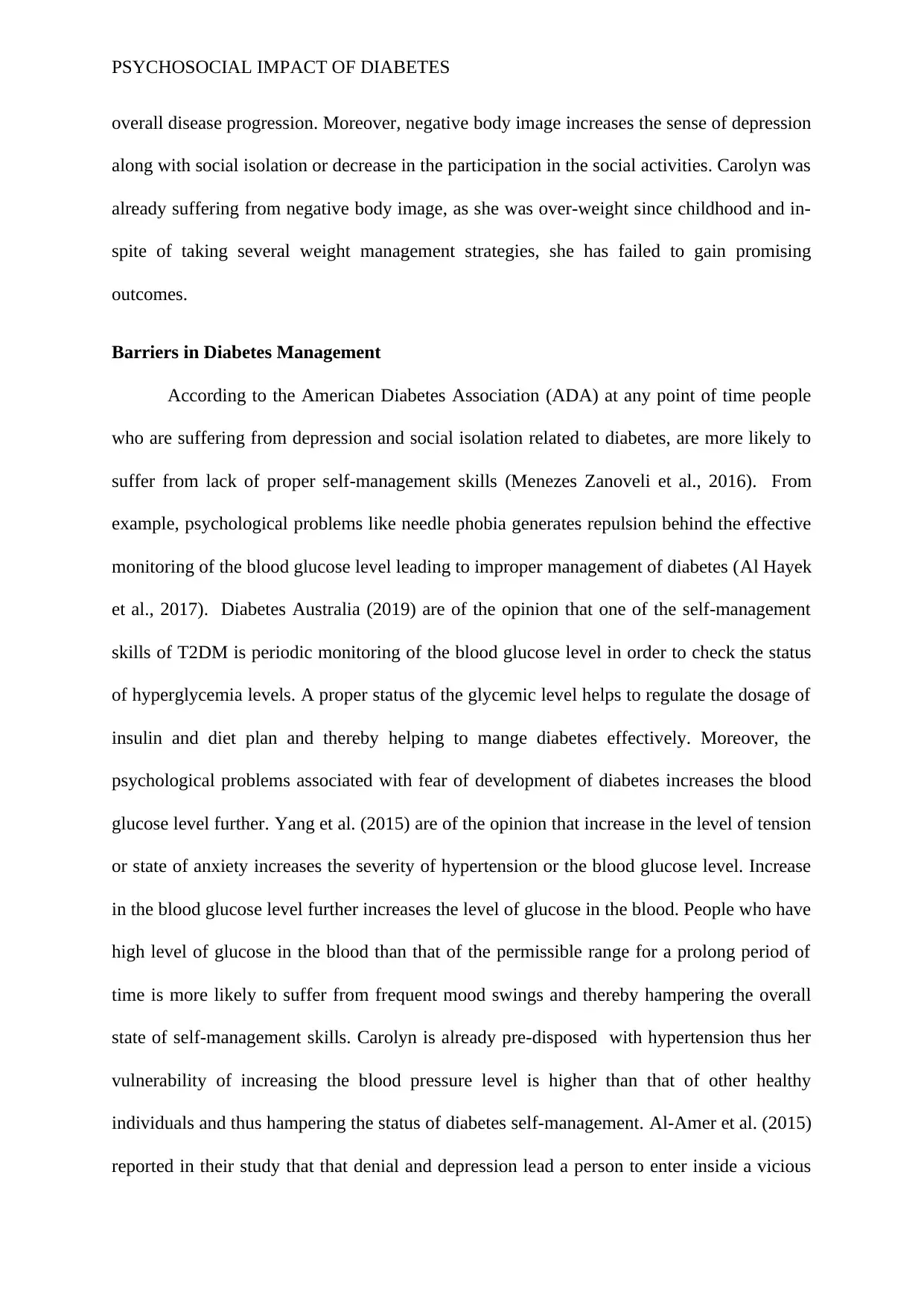
PSYCHOSOCIAL IMPACT OF DIABETES
overall disease progression. Moreover, negative body image increases the sense of depression
along with social isolation or decrease in the participation in the social activities. Carolyn was
already suffering from negative body image, as she was over-weight since childhood and in-
spite of taking several weight management strategies, she has failed to gain promising
outcomes.
Barriers in Diabetes Management
According to the American Diabetes Association (ADA) at any point of time people
who are suffering from depression and social isolation related to diabetes, are more likely to
suffer from lack of proper self-management skills (Menezes Zanoveli et al., 2016). From
example, psychological problems like needle phobia generates repulsion behind the effective
monitoring of the blood glucose level leading to improper management of diabetes (Al Hayek
et al., 2017). Diabetes Australia (2019) are of the opinion that one of the self-management
skills of T2DM is periodic monitoring of the blood glucose level in order to check the status
of hyperglycemia levels. A proper status of the glycemic level helps to regulate the dosage of
insulin and diet plan and thereby helping to mange diabetes effectively. Moreover, the
psychological problems associated with fear of development of diabetes increases the blood
glucose level further. Yang et al. (2015) are of the opinion that increase in the level of tension
or state of anxiety increases the severity of hypertension or the blood glucose level. Increase
in the blood glucose level further increases the level of glucose in the blood. People who have
high level of glucose in the blood than that of the permissible range for a prolong period of
time is more likely to suffer from frequent mood swings and thereby hampering the overall
state of self-management skills. Carolyn is already pre-disposed with hypertension thus her
vulnerability of increasing the blood pressure level is higher than that of other healthy
individuals and thus hampering the status of diabetes self-management. Al-Amer et al. (2015)
reported in their study that that denial and depression lead a person to enter inside a vicious
overall disease progression. Moreover, negative body image increases the sense of depression
along with social isolation or decrease in the participation in the social activities. Carolyn was
already suffering from negative body image, as she was over-weight since childhood and in-
spite of taking several weight management strategies, she has failed to gain promising
outcomes.
Barriers in Diabetes Management
According to the American Diabetes Association (ADA) at any point of time people
who are suffering from depression and social isolation related to diabetes, are more likely to
suffer from lack of proper self-management skills (Menezes Zanoveli et al., 2016). From
example, psychological problems like needle phobia generates repulsion behind the effective
monitoring of the blood glucose level leading to improper management of diabetes (Al Hayek
et al., 2017). Diabetes Australia (2019) are of the opinion that one of the self-management
skills of T2DM is periodic monitoring of the blood glucose level in order to check the status
of hyperglycemia levels. A proper status of the glycemic level helps to regulate the dosage of
insulin and diet plan and thereby helping to mange diabetes effectively. Moreover, the
psychological problems associated with fear of development of diabetes increases the blood
glucose level further. Yang et al. (2015) are of the opinion that increase in the level of tension
or state of anxiety increases the severity of hypertension or the blood glucose level. Increase
in the blood glucose level further increases the level of glucose in the blood. People who have
high level of glucose in the blood than that of the permissible range for a prolong period of
time is more likely to suffer from frequent mood swings and thereby hampering the overall
state of self-management skills. Carolyn is already pre-disposed with hypertension thus her
vulnerability of increasing the blood pressure level is higher than that of other healthy
individuals and thus hampering the status of diabetes self-management. Al-Amer et al. (2015)
reported in their study that that denial and depression lead a person to enter inside a vicious
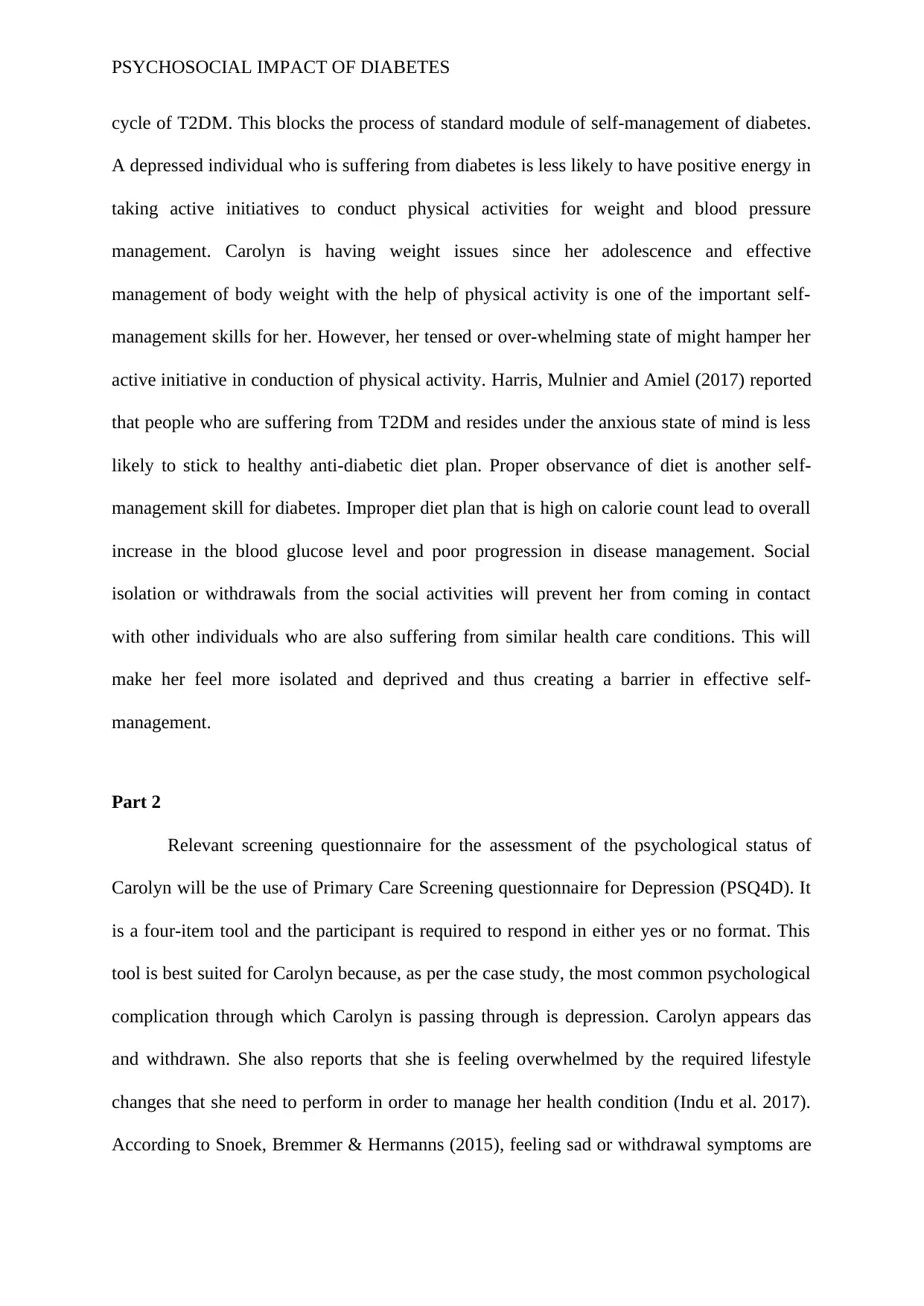
PSYCHOSOCIAL IMPACT OF DIABETES
cycle of T2DM. This blocks the process of standard module of self-management of diabetes.
A depressed individual who is suffering from diabetes is less likely to have positive energy in
taking active initiatives to conduct physical activities for weight and blood pressure
management. Carolyn is having weight issues since her adolescence and effective
management of body weight with the help of physical activity is one of the important self-
management skills for her. However, her tensed or over-whelming state of might hamper her
active initiative in conduction of physical activity. Harris, Mulnier and Amiel (2017) reported
that people who are suffering from T2DM and resides under the anxious state of mind is less
likely to stick to healthy anti-diabetic diet plan. Proper observance of diet is another self-
management skill for diabetes. Improper diet plan that is high on calorie count lead to overall
increase in the blood glucose level and poor progression in disease management. Social
isolation or withdrawals from the social activities will prevent her from coming in contact
with other individuals who are also suffering from similar health care conditions. This will
make her feel more isolated and deprived and thus creating a barrier in effective self-
management.
Part 2
Relevant screening questionnaire for the assessment of the psychological status of
Carolyn will be the use of Primary Care Screening questionnaire for Depression (PSQ4D). It
is a four-item tool and the participant is required to respond in either yes or no format. This
tool is best suited for Carolyn because, as per the case study, the most common psychological
complication through which Carolyn is passing through is depression. Carolyn appears das
and withdrawn. She also reports that she is feeling overwhelmed by the required lifestyle
changes that she need to perform in order to manage her health condition (Indu et al. 2017).
According to Snoek, Bremmer & Hermanns (2015), feeling sad or withdrawal symptoms are
cycle of T2DM. This blocks the process of standard module of self-management of diabetes.
A depressed individual who is suffering from diabetes is less likely to have positive energy in
taking active initiatives to conduct physical activities for weight and blood pressure
management. Carolyn is having weight issues since her adolescence and effective
management of body weight with the help of physical activity is one of the important self-
management skills for her. However, her tensed or over-whelming state of might hamper her
active initiative in conduction of physical activity. Harris, Mulnier and Amiel (2017) reported
that people who are suffering from T2DM and resides under the anxious state of mind is less
likely to stick to healthy anti-diabetic diet plan. Proper observance of diet is another self-
management skill for diabetes. Improper diet plan that is high on calorie count lead to overall
increase in the blood glucose level and poor progression in disease management. Social
isolation or withdrawals from the social activities will prevent her from coming in contact
with other individuals who are also suffering from similar health care conditions. This will
make her feel more isolated and deprived and thus creating a barrier in effective self-
management.
Part 2
Relevant screening questionnaire for the assessment of the psychological status of
Carolyn will be the use of Primary Care Screening questionnaire for Depression (PSQ4D). It
is a four-item tool and the participant is required to respond in either yes or no format. This
tool is best suited for Carolyn because, as per the case study, the most common psychological
complication through which Carolyn is passing through is depression. Carolyn appears das
and withdrawn. She also reports that she is feeling overwhelmed by the required lifestyle
changes that she need to perform in order to manage her health condition (Indu et al. 2017).
According to Snoek, Bremmer & Hermanns (2015), feeling sad or withdrawal symptoms are
⊘ This is a preview!⊘
Do you want full access?
Subscribe today to unlock all pages.

Trusted by 1+ million students worldwide
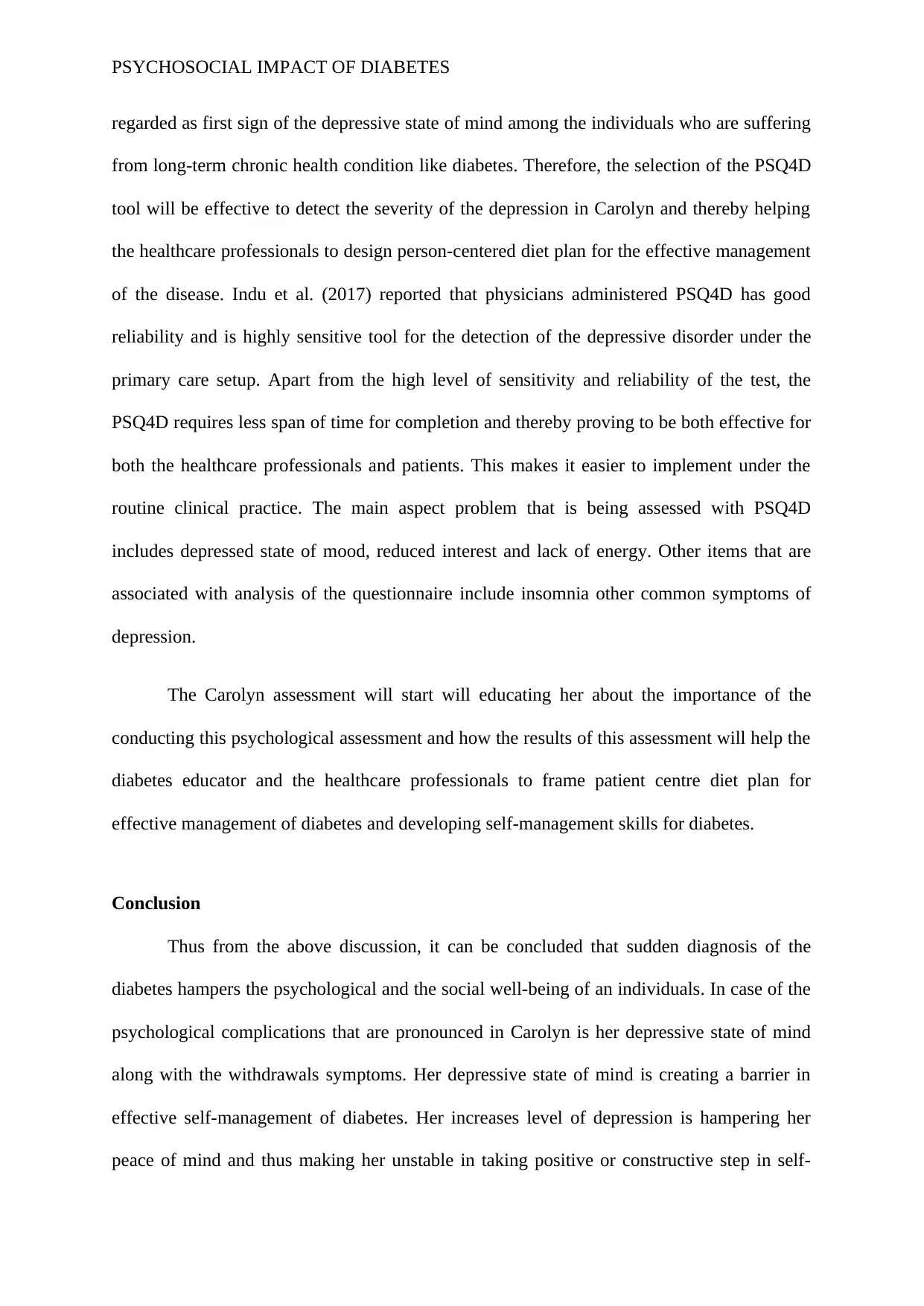
PSYCHOSOCIAL IMPACT OF DIABETES
regarded as first sign of the depressive state of mind among the individuals who are suffering
from long-term chronic health condition like diabetes. Therefore, the selection of the PSQ4D
tool will be effective to detect the severity of the depression in Carolyn and thereby helping
the healthcare professionals to design person-centered diet plan for the effective management
of the disease. Indu et al. (2017) reported that physicians administered PSQ4D has good
reliability and is highly sensitive tool for the detection of the depressive disorder under the
primary care setup. Apart from the high level of sensitivity and reliability of the test, the
PSQ4D requires less span of time for completion and thereby proving to be both effective for
both the healthcare professionals and patients. This makes it easier to implement under the
routine clinical practice. The main aspect problem that is being assessed with PSQ4D
includes depressed state of mood, reduced interest and lack of energy. Other items that are
associated with analysis of the questionnaire include insomnia other common symptoms of
depression.
The Carolyn assessment will start will educating her about the importance of the
conducting this psychological assessment and how the results of this assessment will help the
diabetes educator and the healthcare professionals to frame patient centre diet plan for
effective management of diabetes and developing self-management skills for diabetes.
Conclusion
Thus from the above discussion, it can be concluded that sudden diagnosis of the
diabetes hampers the psychological and the social well-being of an individuals. In case of the
psychological complications that are pronounced in Carolyn is her depressive state of mind
along with the withdrawals symptoms. Her depressive state of mind is creating a barrier in
effective self-management of diabetes. Her increases level of depression is hampering her
peace of mind and thus making her unstable in taking positive or constructive step in self-
regarded as first sign of the depressive state of mind among the individuals who are suffering
from long-term chronic health condition like diabetes. Therefore, the selection of the PSQ4D
tool will be effective to detect the severity of the depression in Carolyn and thereby helping
the healthcare professionals to design person-centered diet plan for the effective management
of the disease. Indu et al. (2017) reported that physicians administered PSQ4D has good
reliability and is highly sensitive tool for the detection of the depressive disorder under the
primary care setup. Apart from the high level of sensitivity and reliability of the test, the
PSQ4D requires less span of time for completion and thereby proving to be both effective for
both the healthcare professionals and patients. This makes it easier to implement under the
routine clinical practice. The main aspect problem that is being assessed with PSQ4D
includes depressed state of mood, reduced interest and lack of energy. Other items that are
associated with analysis of the questionnaire include insomnia other common symptoms of
depression.
The Carolyn assessment will start will educating her about the importance of the
conducting this psychological assessment and how the results of this assessment will help the
diabetes educator and the healthcare professionals to frame patient centre diet plan for
effective management of diabetes and developing self-management skills for diabetes.
Conclusion
Thus from the above discussion, it can be concluded that sudden diagnosis of the
diabetes hampers the psychological and the social well-being of an individuals. In case of the
psychological complications that are pronounced in Carolyn is her depressive state of mind
along with the withdrawals symptoms. Her depressive state of mind is creating a barrier in
effective self-management of diabetes. Her increases level of depression is hampering her
peace of mind and thus making her unstable in taking positive or constructive step in self-
Paraphrase This Document
Need a fresh take? Get an instant paraphrase of this document with our AI Paraphraser
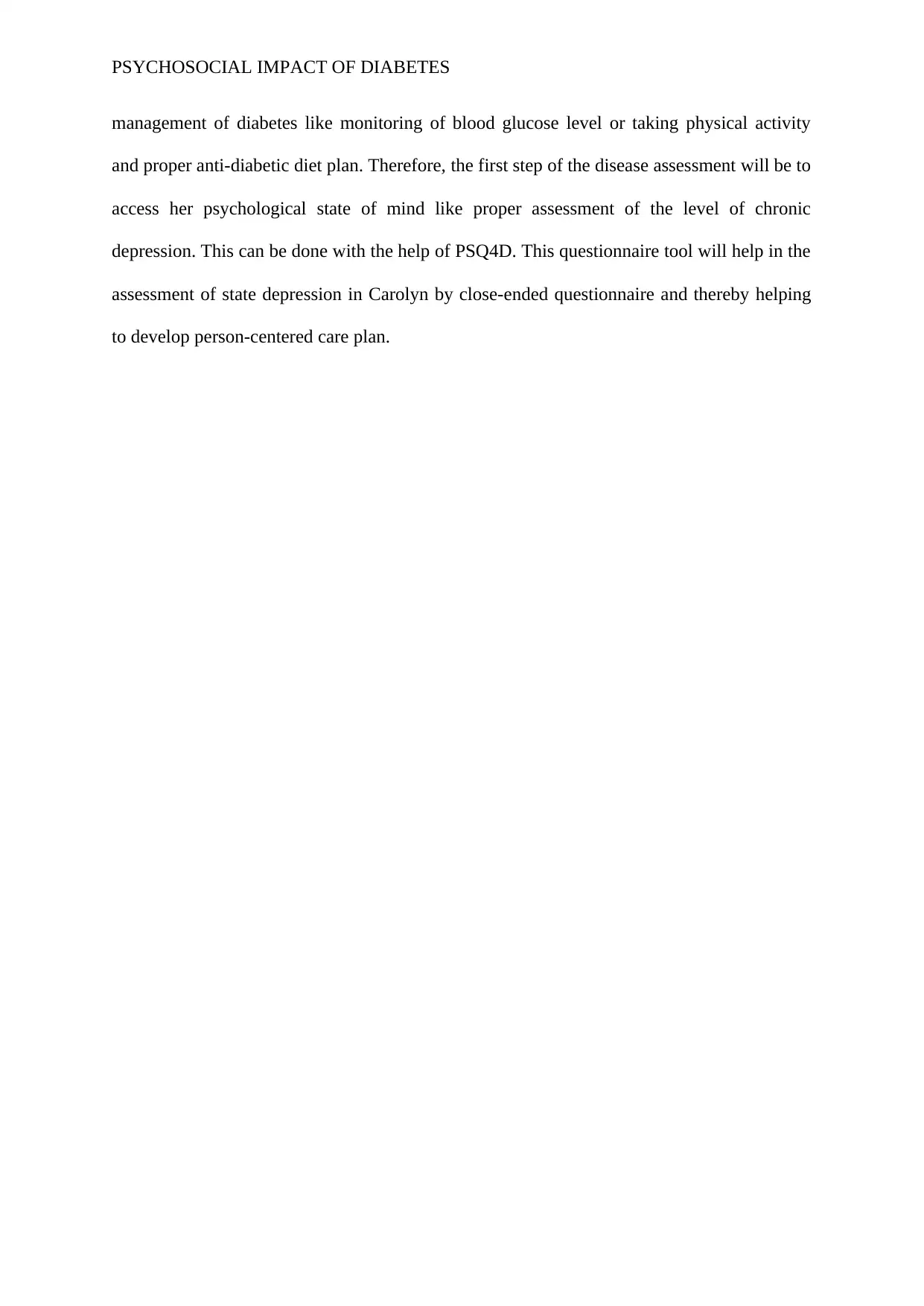
PSYCHOSOCIAL IMPACT OF DIABETES
management of diabetes like monitoring of blood glucose level or taking physical activity
and proper anti-diabetic diet plan. Therefore, the first step of the disease assessment will be to
access her psychological state of mind like proper assessment of the level of chronic
depression. This can be done with the help of PSQ4D. This questionnaire tool will help in the
assessment of state depression in Carolyn by close-ended questionnaire and thereby helping
to develop person-centered care plan.
management of diabetes like monitoring of blood glucose level or taking physical activity
and proper anti-diabetic diet plan. Therefore, the first step of the disease assessment will be to
access her psychological state of mind like proper assessment of the level of chronic
depression. This can be done with the help of PSQ4D. This questionnaire tool will help in the
assessment of state depression in Carolyn by close-ended questionnaire and thereby helping
to develop person-centered care plan.
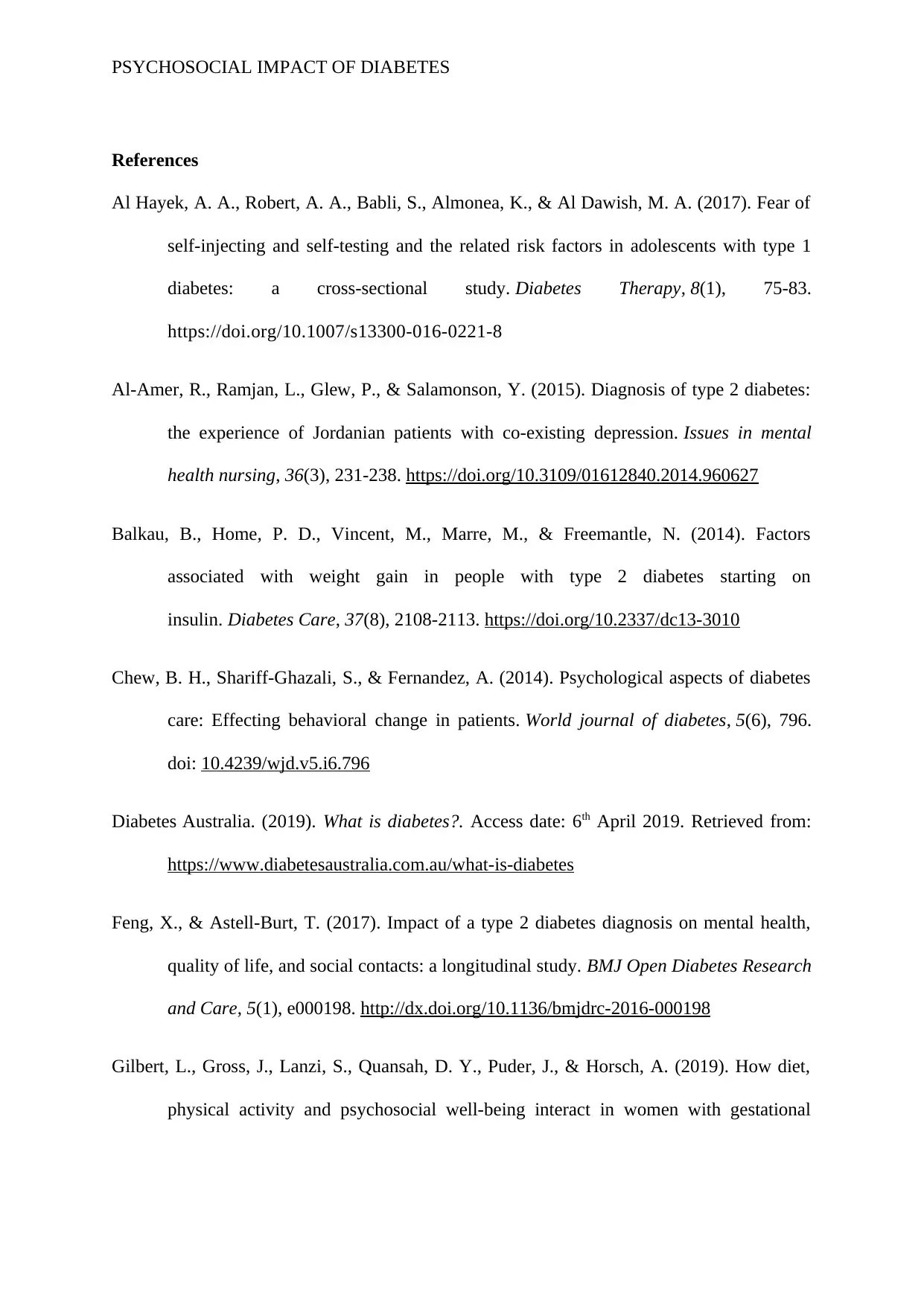
PSYCHOSOCIAL IMPACT OF DIABETES
References
Al Hayek, A. A., Robert, A. A., Babli, S., Almonea, K., & Al Dawish, M. A. (2017). Fear of
self-injecting and self-testing and the related risk factors in adolescents with type 1
diabetes: a cross-sectional study. Diabetes Therapy, 8(1), 75-83.
https://doi.org/10.1007/s13300-016-0221-8
Al-Amer, R., Ramjan, L., Glew, P., & Salamonson, Y. (2015). Diagnosis of type 2 diabetes:
the experience of Jordanian patients with co-existing depression. Issues in mental
health nursing, 36(3), 231-238. https://doi.org/10.3109/01612840.2014.960627
Balkau, B., Home, P. D., Vincent, M., Marre, M., & Freemantle, N. (2014). Factors
associated with weight gain in people with type 2 diabetes starting on
insulin. Diabetes Care, 37(8), 2108-2113. https://doi.org/10.2337/dc13-3010
Chew, B. H., Shariff-Ghazali, S., & Fernandez, A. (2014). Psychological aspects of diabetes
care: Effecting behavioral change in patients. World journal of diabetes, 5(6), 796.
doi: 10.4239/wjd.v5.i6.796
Diabetes Australia. (2019). What is diabetes?. Access date: 6th April 2019. Retrieved from:
https://www.diabetesaustralia.com.au/what-is-diabetes
Feng, X., & Astell-Burt, T. (2017). Impact of a type 2 diabetes diagnosis on mental health,
quality of life, and social contacts: a longitudinal study. BMJ Open Diabetes Research
and Care, 5(1), e000198. http://dx.doi.org/10.1136/bmjdrc-2016-000198
Gilbert, L., Gross, J., Lanzi, S., Quansah, D. Y., Puder, J., & Horsch, A. (2019). How diet,
physical activity and psychosocial well-being interact in women with gestational
References
Al Hayek, A. A., Robert, A. A., Babli, S., Almonea, K., & Al Dawish, M. A. (2017). Fear of
self-injecting and self-testing and the related risk factors in adolescents with type 1
diabetes: a cross-sectional study. Diabetes Therapy, 8(1), 75-83.
https://doi.org/10.1007/s13300-016-0221-8
Al-Amer, R., Ramjan, L., Glew, P., & Salamonson, Y. (2015). Diagnosis of type 2 diabetes:
the experience of Jordanian patients with co-existing depression. Issues in mental
health nursing, 36(3), 231-238. https://doi.org/10.3109/01612840.2014.960627
Balkau, B., Home, P. D., Vincent, M., Marre, M., & Freemantle, N. (2014). Factors
associated with weight gain in people with type 2 diabetes starting on
insulin. Diabetes Care, 37(8), 2108-2113. https://doi.org/10.2337/dc13-3010
Chew, B. H., Shariff-Ghazali, S., & Fernandez, A. (2014). Psychological aspects of diabetes
care: Effecting behavioral change in patients. World journal of diabetes, 5(6), 796.
doi: 10.4239/wjd.v5.i6.796
Diabetes Australia. (2019). What is diabetes?. Access date: 6th April 2019. Retrieved from:
https://www.diabetesaustralia.com.au/what-is-diabetes
Feng, X., & Astell-Burt, T. (2017). Impact of a type 2 diabetes diagnosis on mental health,
quality of life, and social contacts: a longitudinal study. BMJ Open Diabetes Research
and Care, 5(1), e000198. http://dx.doi.org/10.1136/bmjdrc-2016-000198
Gilbert, L., Gross, J., Lanzi, S., Quansah, D. Y., Puder, J., & Horsch, A. (2019). How diet,
physical activity and psychosocial well-being interact in women with gestational
⊘ This is a preview!⊘
Do you want full access?
Subscribe today to unlock all pages.

Trusted by 1+ million students worldwide
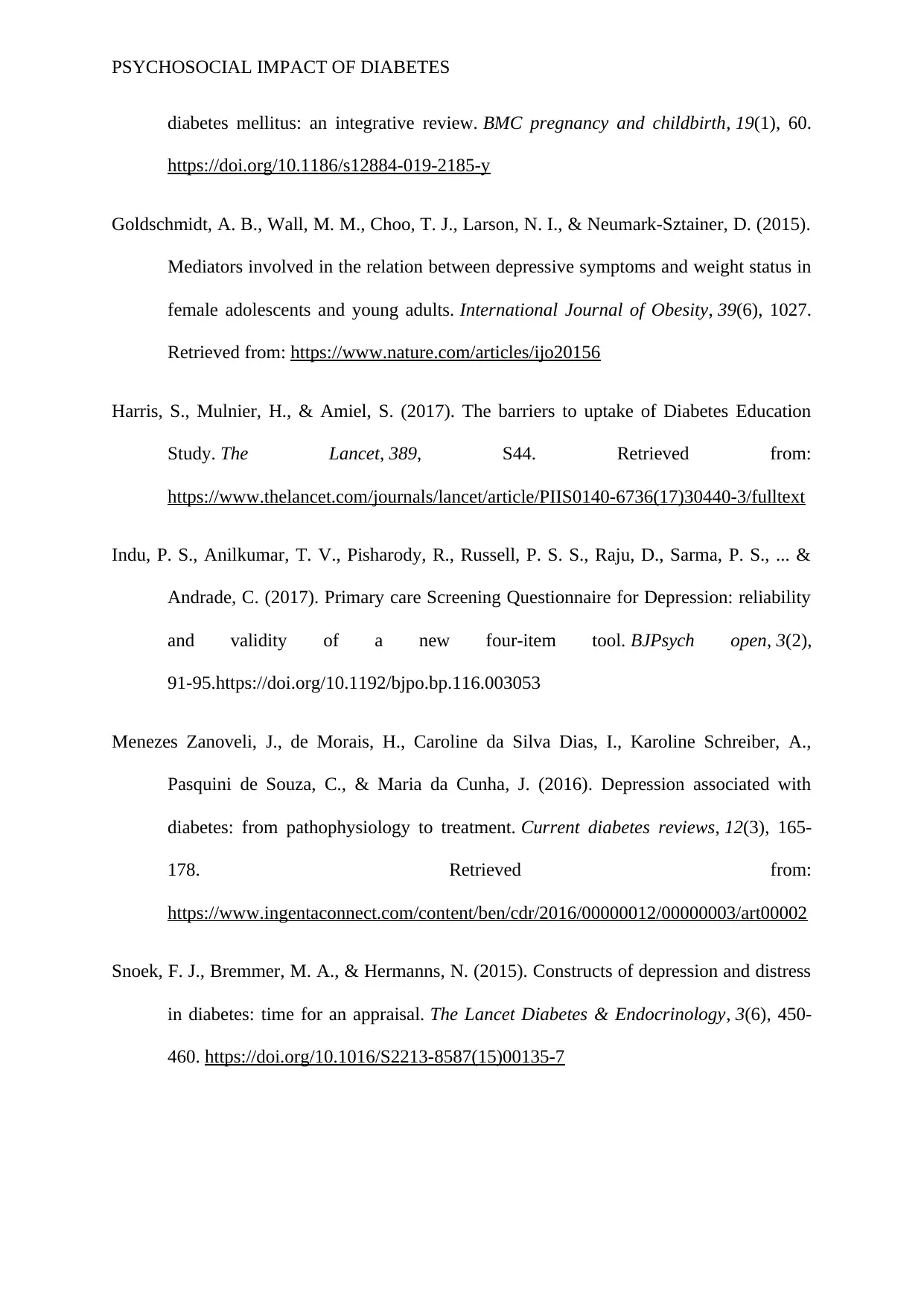
PSYCHOSOCIAL IMPACT OF DIABETES
diabetes mellitus: an integrative review. BMC pregnancy and childbirth, 19(1), 60.
https://doi.org/10.1186/s12884-019-2185-y
Goldschmidt, A. B., Wall, M. M., Choo, T. J., Larson, N. I., & Neumark-Sztainer, D. (2015).
Mediators involved in the relation between depressive symptoms and weight status in
female adolescents and young adults. International Journal of Obesity, 39(6), 1027.
Retrieved from: https://www.nature.com/articles/ijo20156
Harris, S., Mulnier, H., & Amiel, S. (2017). The barriers to uptake of Diabetes Education
Study. The Lancet, 389, S44. Retrieved from:
https://www.thelancet.com/journals/lancet/article/PIIS0140-6736(17)30440-3/fulltext
Indu, P. S., Anilkumar, T. V., Pisharody, R., Russell, P. S. S., Raju, D., Sarma, P. S., ... &
Andrade, C. (2017). Primary care Screening Questionnaire for Depression: reliability
and validity of a new four-item tool. BJPsych open, 3(2),
91-95.https://doi.org/10.1192/bjpo.bp.116.003053
Menezes Zanoveli, J., de Morais, H., Caroline da Silva Dias, I., Karoline Schreiber, A.,
Pasquini de Souza, C., & Maria da Cunha, J. (2016). Depression associated with
diabetes: from pathophysiology to treatment. Current diabetes reviews, 12(3), 165-
178. Retrieved from:
https://www.ingentaconnect.com/content/ben/cdr/2016/00000012/00000003/art00002
Snoek, F. J., Bremmer, M. A., & Hermanns, N. (2015). Constructs of depression and distress
in diabetes: time for an appraisal. The Lancet Diabetes & Endocrinology, 3(6), 450-
460. https://doi.org/10.1016/S2213-8587(15)00135-7
diabetes mellitus: an integrative review. BMC pregnancy and childbirth, 19(1), 60.
https://doi.org/10.1186/s12884-019-2185-y
Goldschmidt, A. B., Wall, M. M., Choo, T. J., Larson, N. I., & Neumark-Sztainer, D. (2015).
Mediators involved in the relation between depressive symptoms and weight status in
female adolescents and young adults. International Journal of Obesity, 39(6), 1027.
Retrieved from: https://www.nature.com/articles/ijo20156
Harris, S., Mulnier, H., & Amiel, S. (2017). The barriers to uptake of Diabetes Education
Study. The Lancet, 389, S44. Retrieved from:
https://www.thelancet.com/journals/lancet/article/PIIS0140-6736(17)30440-3/fulltext
Indu, P. S., Anilkumar, T. V., Pisharody, R., Russell, P. S. S., Raju, D., Sarma, P. S., ... &
Andrade, C. (2017). Primary care Screening Questionnaire for Depression: reliability
and validity of a new four-item tool. BJPsych open, 3(2),
91-95.https://doi.org/10.1192/bjpo.bp.116.003053
Menezes Zanoveli, J., de Morais, H., Caroline da Silva Dias, I., Karoline Schreiber, A.,
Pasquini de Souza, C., & Maria da Cunha, J. (2016). Depression associated with
diabetes: from pathophysiology to treatment. Current diabetes reviews, 12(3), 165-
178. Retrieved from:
https://www.ingentaconnect.com/content/ben/cdr/2016/00000012/00000003/art00002
Snoek, F. J., Bremmer, M. A., & Hermanns, N. (2015). Constructs of depression and distress
in diabetes: time for an appraisal. The Lancet Diabetes & Endocrinology, 3(6), 450-
460. https://doi.org/10.1016/S2213-8587(15)00135-7
Paraphrase This Document
Need a fresh take? Get an instant paraphrase of this document with our AI Paraphraser
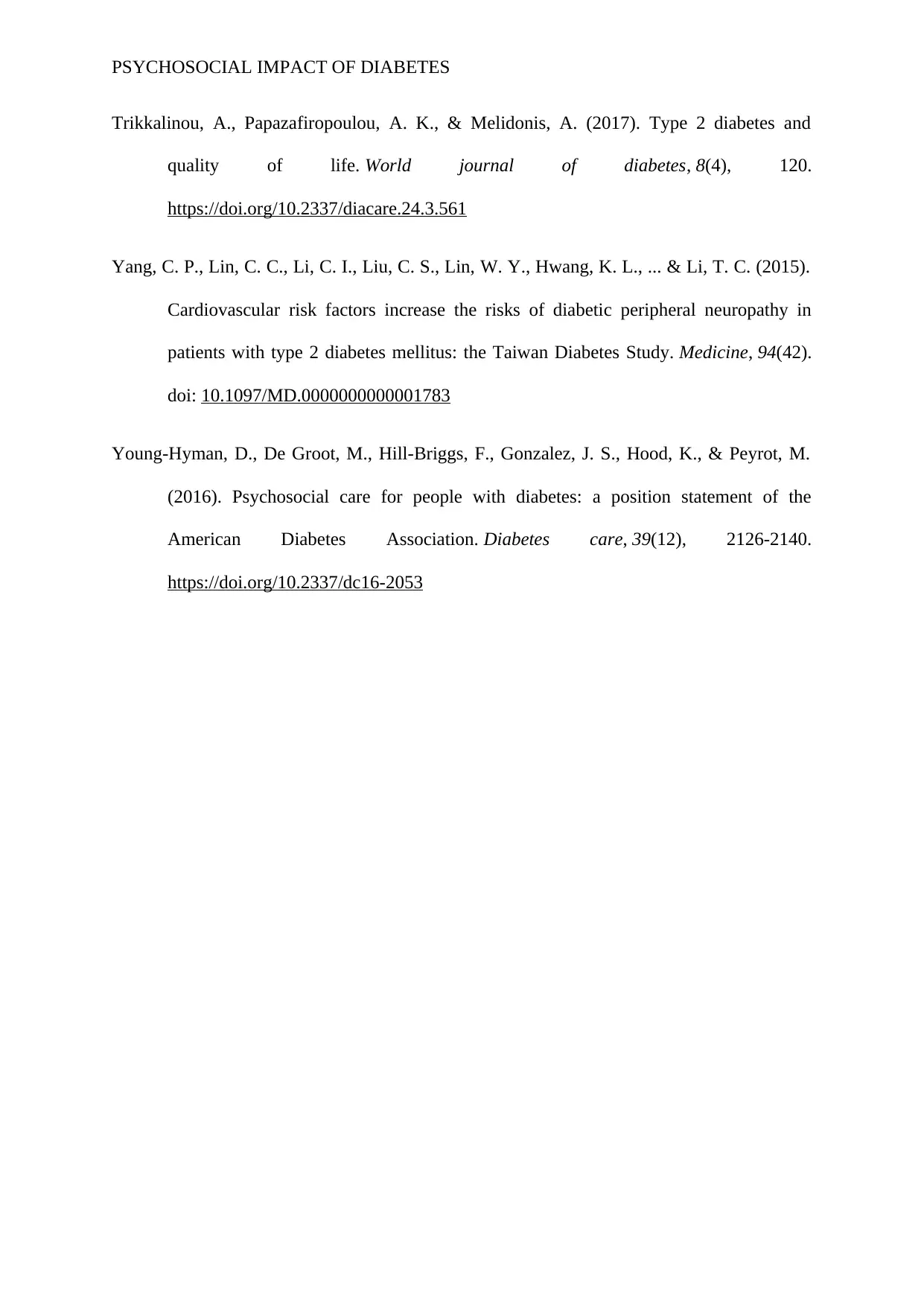
PSYCHOSOCIAL IMPACT OF DIABETES
Trikkalinou, A., Papazafiropoulou, A. K., & Melidonis, A. (2017). Type 2 diabetes and
quality of life. World journal of diabetes, 8(4), 120.
https://doi.org/10.2337/diacare.24.3.561
Yang, C. P., Lin, C. C., Li, C. I., Liu, C. S., Lin, W. Y., Hwang, K. L., ... & Li, T. C. (2015).
Cardiovascular risk factors increase the risks of diabetic peripheral neuropathy in
patients with type 2 diabetes mellitus: the Taiwan Diabetes Study. Medicine, 94(42).
doi: 10.1097/MD.0000000000001783
Young-Hyman, D., De Groot, M., Hill-Briggs, F., Gonzalez, J. S., Hood, K., & Peyrot, M.
(2016). Psychosocial care for people with diabetes: a position statement of the
American Diabetes Association. Diabetes care, 39(12), 2126-2140.
https://doi.org/10.2337/dc16-2053
Trikkalinou, A., Papazafiropoulou, A. K., & Melidonis, A. (2017). Type 2 diabetes and
quality of life. World journal of diabetes, 8(4), 120.
https://doi.org/10.2337/diacare.24.3.561
Yang, C. P., Lin, C. C., Li, C. I., Liu, C. S., Lin, W. Y., Hwang, K. L., ... & Li, T. C. (2015).
Cardiovascular risk factors increase the risks of diabetic peripheral neuropathy in
patients with type 2 diabetes mellitus: the Taiwan Diabetes Study. Medicine, 94(42).
doi: 10.1097/MD.0000000000001783
Young-Hyman, D., De Groot, M., Hill-Briggs, F., Gonzalez, J. S., Hood, K., & Peyrot, M.
(2016). Psychosocial care for people with diabetes: a position statement of the
American Diabetes Association. Diabetes care, 39(12), 2126-2140.
https://doi.org/10.2337/dc16-2053
1 out of 11
Related Documents
Your All-in-One AI-Powered Toolkit for Academic Success.
+13062052269
info@desklib.com
Available 24*7 on WhatsApp / Email
![[object Object]](/_next/static/media/star-bottom.7253800d.svg)
Unlock your academic potential
Copyright © 2020–2026 A2Z Services. All Rights Reserved. Developed and managed by ZUCOL.





